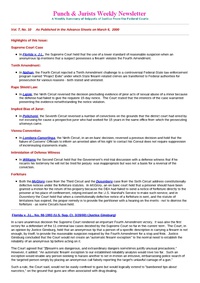Jumping in line with all the Circuit Courts that have ruled on the issue, a divided en banc Court from the Ninth Circuit has now vacated and reversed a panel’s earlier decision in this case, reported at 170 F.3d 1241 (9th Cir. 1999) (See P&J, 6/7/99). In the earlier …
In this case the Seventh Circuit addressed an issue that has created a broad split among the Circuits - namely what standards of review should be used to determine whether a defendant's prior offenses were "consolidated" for purposes of the career offender provisions of U.S.S.G. § 4B1.1. That issue …
in this case, the defendant first argued that the waiver of appellate review set forth in his plea agreement was invalid because the district court itself did not address the waiver provision and explain its consequences at the change-of-plea proceedings. The Court rejected that argument, stating: " We
are …
In this case, the defendant, Williams, was convicted of one count of conspiracy to import cocaine and one count of importation of cocaine. The defendant and two co-conspirators were involved in importing cocaine from Jamaica to the United States. On appeal the defendant argued that the Government violated his …
Here the Court held that an anonymous tip that a person of a specific description is carrying a firearm is not enough, by itself, to provide the reasonable suspicion required by the Fourth Amendment to justify a stop and frisk of the suspect.
In a surprising unanimous decision …
Some years ago, District Judge Stanley Sporkin condemned the Parole Commission for its policy of placing probationers on a never-ending treadmill, by violating them for various infractions of their “special parole”, and then reimposing a full new term of supervision, without any credit for time previously served. Judge Sporkin …
Here the Court reversed a decision precluding evidence of prior acts of sexual abuse of a minor because the defense had failed to give the requisite 15-day notice, holding that the interests of the case warranted the use of such evidence.
In this case the defendant appealed the …
This is a rare case in which the Court reversed four convictions because the district court (Judge Hart) had refused to excuse, for cause, a potential juror who had worked - for some 15 years - in precisely the same office of the U.S. Attorney who was handling this …
QUOTE OF THE WEEK - The Sixth Amendment right to an impartial jury in the Seventh Circuit
Despite the Seventh Circuit’s ruling in the Polchemi case, a review of some of its past precedents presents a somewhat different picture. For example, in U.S. v. Beasley, 48 F.3d 262 (7th …
In the case, the Government contended, and the panel agreed, that a taxi driver's voluntary participation in a Taxi Inspection Program for Safety (TIPS), granted the police the right to search any passengers in the taxi on the grounds that the taxi-owner's consent constituted a consent by the passenger. …
This forfeiture case is noted for its discussion of a property owner’s rights and remedies in a forfeiture case where the Government initially gave constitutionally defective notice of the proposed forfeiture and, by the time that issue was established, the applicable statute of limitations had passed. Thus, the issue …
Here the Court vacated a CCE conviction because the district court had failed to give the now-required jury instruction, a la Richardson v. U.S., 526 U.S. 813 (1999), of the need to unanimously agree not only that the defendant committed some "continuing series of violations" but also that the …
This case deals with the controversial program, known as Project Exile, which was implemented in the cities of Norfolk and Richmond, Virginia in late 1996, under which State firearms-related crimes are transferred to Federal authorities for prosecution. Whenever the local police make an arrest in cases where the alleged …
Here, as a matter of first impression, the Court held that 18 USC § 513(c)(1), which proscribes the the making of counterfeit securities, does not require proof of similitude to the genuine securities, as required by most other counterfeiting laws.
The defendant in this case, a real estate …
Here the Court held that the hearsay rule's business records exception applies only to materials that have been created or adopted by the business records keeper and does not apply to information that is received rather than prepared by the business.
The defendant in this case, the Treasurer …
In this case the defendant attempted to withdraw his plea under Fed.R.Crim.P. 32(e) on the grounds that neither his attorneys nor the district judge advised him that if he pleaded guilty, he would be deemed "deportable" and subject to detention by the INS. He further complains that the district …
This is one of those forfeiture cases in which it is hard to believe that the Government could even argue with a straight face its position that the defendant had received adequate notice of a forfeiture. In this case, the DEA sent two notices of forfeiture to the defendant …
The defendant in this case was convicted, inter alia, of violating 18 U.S.C. § 1363, which criminalizes the destruction of certain property, as a result of firing gunshots into an occupied house on a military base. Under the statute, an increased penalty applies if the property damaged is a …
This supervised release case is noted principally for its detailed discussion of the legislative history of 18 U.S.C. § 3563(b) and its focus on what the Court described as a "clerical error" in its failure to track the identical language contained in the statutes dealing with probation.
The defendant …
